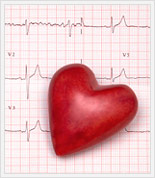 |
Already a member? Secure Login
|

- Ideal Weight Calculator
- Waist-to-Hip Ratio Calculator
- BMI Calculator
- Frame Size Calculator
- Target Heart Rate Calculator

- Good Fast Food
- Recipe Makeovers
- Meal Plans
- Nutrient Facts
- Food Label Claims
- Estimating Serving Sizes



Exercise Stress Test
QUESTION:
I heard that the exercise physiology lab at my local university is offering exercise stress tests. What is this test and what information can it give me?
I heard that the exercise physiology lab at my local university is offering exercise stress tests. What is this test and what information can it give me?
ANSWER:
 An exercise stress test measures cardiovascular fitness. It can be performed on individuals with a wide range of fitness levels and is considered to be a valuable diagnostic tool for identifying coronary heart disease and certain lung diseases.
An exercise stress test measures cardiovascular fitness. It can be performed on individuals with a wide range of fitness levels and is considered to be a valuable diagnostic tool for identifying coronary heart disease and certain lung diseases.During a stress test, a health professional will monitor your blood pressure, heart rate, and will often rate the level of exertion. Additionally, an electrocardiogram (EKG) is typically monitored to assess heart function. If the heart is not functioning properly, the increase in stress can often reveal the presence of cardiovascular diseases and heart defects. The diagnostic value of the stress test and the fact that it is relatively inexpensive to conduct make it a popular first choice for assessing the health of the cardiovascular system.
For the athlete or individual seeking to increase physical fitness, an exercise stress test can provide an estimation of the maximal rate of oxygen consumption (VO2 max) – an indicator of aerobic fitness. Direct measurement of VO2 max requires the individual to breathe into a mouthpiece throughout the test, allowing the analysis of expired air. The direct measurement of VO2 max requires experienced personnel and elaborate equipment. It is usually reserved for clinical and research settings or for elite athletes.
Stress tests will typically last 8-12 minutes and will involve a warm-up and cool-down period. The exercising individual is in control of the test at all times and can request that the test be stopped at any time. However, the person conducting the test will typically encourage the individual to exercise for as long as possible to ensure good data.
In summary, the data collected during stress tests can provide valuable feedback concerning your health and fitness level. Oftentimes, obtaining a stress test will jumpstart an exercise program by providing an incentive to get moving. Follow-up testing is valuable to assess improvement and progression of your program and is a great motivator.
| Related Articles: |
 |
Our expert, Dr. Sharon E. Griffin, holds a B.S., M.S., and Ph.D. in the areas of exercise science/physiology. She also holds a second M.S. degree in Nutrition and is a licensed nutritionist and an ACSM certified health and fitness instructor.
© 2024 MyFoodDiary.com. All Rights Reserved.